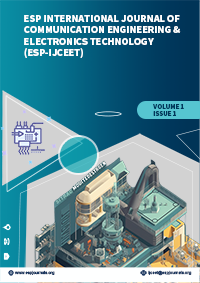ESP International Journal of Communication Engineering & Electronics Technology (ESP-IJCEET)
Citation :
AnNing, Mazida Ahmad, Huda lbrahim, 2024. "Research on the Design and Optimization of Human-Computer Interaction Experience Based on Augmented Reality" ESP International Journal of Communication Engineering & Electronics Technology (ESP- IJCEET) Volume 2, Issue 1 : 47-54
.Abstract :
With the development and application of information technologies such as artificial intelligence, big data, and cloud computing, research on augmented reality technology has become a major focus in the field of information technology. Augmented reality technology, which allows virtual scenes and real scenes to interact deeply with the assistance of computer graphics and sensing technologies, not only integrates virtual information into real scenes but also enhances the transmission of various types of information such as images, sounds, and sensations. This technology further enriches various social activities of human beings and finds wide applications in various fields, promoting social development. Human-computer interaction plays a crucial role in augmented reality technology. Excellent human-computer interaction design can effectively improve the application value of augmented reality technology, enhance user experience, and reduce the probability of device failures. Thus, the development of augmented reality systems that meet the practical needs of different users greatly relies on exploring human-computer interaction techniques and optimizing them within augmented reality systems. This research has significant importance and application value.
References :
[1] Liu B, Gu B. Creative Design Research on Non-legacy Music Aesthetic Education System Based on Meta-Universe VR[J]. Journal of Suzhou University of Science and Technology (Natural Science Edition), 2023, 40(1): 79-84.
[2] Xu N, Fan W. Research on Interactive Numerical Optimization Augmented Reality Teaching System[J]. Computer Simulation, 2020, 37(11): 203-206, 298.
[3] Li F. Research on 3D Shooting Game Development Based on VR Technology[J]. Automation Technology and Applications, 2021, 40(1): 163-166.
[4] Gao L. Design of Physics Simulation Experimental System Based on Virtual Reality[J]. Modern Electronics Technique, 2021, 44(12): 49-52. [5] Wang S, Yang H, Wang F, et al. Overview of AR Technology in Satellite Cable Design and Assembly[J]. Computer Measurement and Control, 2020, 28(1): 1-3, 25.
[6] Lin P, Wang J. Application Research of BIM and AR in Comprehensive Pipeline Collision Inspection[J]. Science and Technology Innovation, 2023(2): 188-191.
[7] Yuan Q, Wang R, Pan Z, et al. A Review of Human-Computer Interaction Techniques in Spatial Augmented Reality[J]. Journal of Computer-Aided Design and Computer Graphics, 2021, 33(3): 321-332.
[8] Guo N, Wang T, Hu L, et al. Human-Computer Interaction Techniques in ACL Reconstruction Surgery Augmented Reality Navigation System[J]. Computer Engineering and Applications, 2020, 56(21): 224-230.
[9] Zhang H, Zhang D, Wang Z, et al. Ultrastretchable, Self-Healing Conductive Hydrogel-Based Triboelectric Nanogenerators for Human-Computer Interaction[J]. ACS applied materials & interfaces, 2023, 15(4): 5128-5138.
[10] Ke J, Zhang L. Research on Real-Time Gesture Recognition Method for Virtual Reality/Augmented Reality Human-Computer Interaction[J]. Modern Computer, 2023, 29(1): 59-62.
[11] Wang L, Yang S. Research on Augmented Reality Human-Computer Interaction Technology[J]. Computer Knowledge and Technology, 2021, 17(14): 179-180.
[12] Ren M, Chen N, Qiu H. Human-machine Collaborative Decision-making: An Evolutionary Roadmap Based on Cognitive Intelligence[J]. International Journal of Social Robotics, 2023, 15(7): 1101-1114.
[13] Li H, Yan X. Research on Human-Computer Interaction and Interaction Design in Augmented Reality[J]. Fascinating China, 2020(46): 177.
Keywords :
Augmented Reality, Human-Computer Interaction, Design and Optimization.


